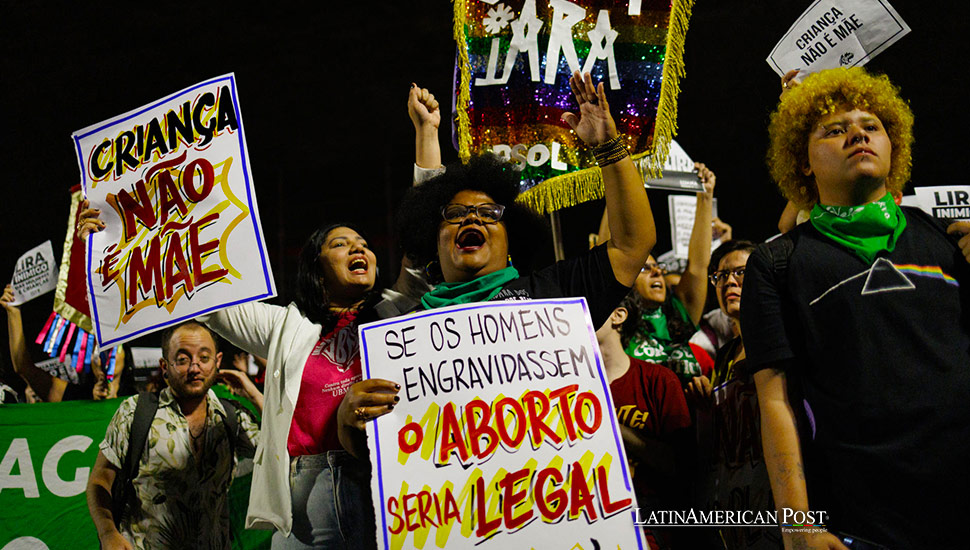Brazilian Women Protest Bill Equating Abortion to Homicide

Hundreds of Brazilian women took to the streets in São Paulo and Rio de Janeiro to protest against a controversial bill that aims to criminalize abortions after 22 weeks of pregnancy, equating them with homicide.
Hundreds of Brazilian women marched through the streets of São Paulo and Rio de Janeiro on Thursday to protest against a controversial bill that seeks to criminalize abortions after 22 weeks of pregnancy, equating them with homicide. The proposed legislation has sparked nationwide outrage among women’s rights activists and progressive sectors.
In São Paulo, the protesters marched along Avenida Paulista, one of the main thoroughfares of Brazil’s largest city, chanting slogans against the President of the Chamber of Deputies, Arthur Lira. They carried signs with messages such as “If men got pregnant, abortion would be legal” and “Legal abortion now,” among other pro-choice declarations.
In Rio de Janeiro, hundreds of women gathered in front of the Municipal Chamber of the capital. Some protesters carried flowers and a small coffin as a symbol of mourning. The demonstration reflected the deep-seated concerns about the potential impact of the proposed law on women’s rights and health.
Currently, abortion in Brazil is only permitted in cases of rape, anencephaly (a severe brain malformation), or when the pregnancy poses a risk to the mother’s life. There are no time limits for performing the procedure under these circumstances. However, the new bill, introduced by Deputy Sóstenes Cavalcante of the Liberal Party (PL), which former far-right President Jair Bolsonaro leads, seeks to impose severe penalties for abortions performed after 22 weeks. Cavalcante, known for his opposition to abortion, gender ideology, and drug legalization, has been a vocal proponent of the bill.
The proposed modification to the Civil Code would equate abortions after 22 weeks to “simple homicide,” punishable by prison sentences ranging from six to twenty years. This move has intensified the already heated debate on reproductive rights in Brazil, a country with a predominantly conservative legislative body.
Legislative Challenges and Political Backdrop
The bill advanced in the lower house of Congress, dominated by conservative forces, after receiving an urgent review status on Wednesday. This fast-tracking means the bill will proceed through the legislative process more quickly than usual, bypassing some standard procedural steps.
If approved by both the Chamber of Deputies and the Senate, the bill would impose homicide-level penalties on women who undergo abortions after 22 weeks, even in cases of rape. This has provoked a wave of protests from progressive groups, who argue that the law would impose harsher penalties on rape victims seeking abortions than on their attackers. Under current Brazilian law, convicted rapists face sentences ranging from six to twelve years.
President Luiz Inácio Lula da Silva’s government has strongly condemned the bill. Women’s Minister Cida Gonçalves took to social media on Thursday to denounce the proposal, calling it “a serious setback for women’s rights.” She emphasized the government’s commitment to defending women’s reproductive rights and warned against regressive legislation.
Arthur Lira, the President of the Chamber of Deputies, suggested to the newspaper O Globo that the bill would be amended to protect the cases already permitted by law. He assured that, despite the urgency status, the bill would undergo extensive debate in the lower house, where women occupy only 91 of the 513 seats, representing a mere 17.7%.
The ongoing protests in Brazil are part of a more significant movement across Latin America, where women’s rights activists have been fighting for reproductive rights and gender equality. In recent years, several Latin American countries have made significant strides in decriminalizing and legalizing abortion. For instance, Argentina legalized abortion in 2020, and Mexico’s Supreme Court ruled in favor of decriminalizing abortion in 2021.
The Brazilian protests echo the broader regional struggle, highlighting the disparity between progressive movements and conservative political forces. The clash over abortion rights is symbolic of the ongoing battle for gender equality in Latin America, where deeply rooted patriarchal norms and religious influences often shape legislative agendas.
Broader Implications and Future Outlook
The proposed legislation in Brazil has far-reaching implications for women’s health and autonomy and the broader fight for gender equality in Latin America. Legal experts and human rights organizations have warned that criminalizing abortions after 22 weeks could lead to an increase in unsafe and clandestine abortions, putting women’s lives at risk.
The debate over the bill also underscores the need for more excellent representation of women in political institutions. The underrepresentation of women in Brazil’s legislative bodies means that policies affecting women’s rights are often debated and decided by predominantly male lawmakers, leading to outcomes that need to reflect women’s perspectives and needs adequately.
As the bill moves through the legislative process, it remains to be seen whether the proposed amendments will be sufficient to address the concerns of women’s rights activists. The Brazilian government and civil society organizations will need to continue advocating for policies that protect and promote women’s reproductive rights, ensuring that any changes to the law do not undermine the progress made in recent years.
The protests in São Paulo and Rio de Janeiro are a testament to the resilience and determination of Brazilian women in the face of regressive policies. Amplified by the broader regional movement for reproductive rights, their voices will play a crucial role in shaping the future of women’s health and autonomy in Brazil and beyond.
Also read: Brazil Adopts OpenAI for Legal Efficiency Amid Rising Court Costs
The ongoing struggle for reproductive rights in Brazil is a critical issue that resonates across Latin America. As women continue to fight for their rights and freedoms, the outcome of this legislative battle will have significant implications for the region. The resilience and activism of Brazilian women serve as an inspiration and a call to action for all those committed to gender equality and justice.





